Healthcare reform: how will the “secondary link” change?
Yevhen Meshko, Regional Coordinator for Healthcare Reform Support in Zakarpattia Oblast
All attention to the secondary healthcare level is focused on a change in the funding system. Everyone is actively preparing to reach an agreement with the National Health Service of Ukraine. Only fierce conservatives are still pondering whether to carry out autonomisation or not? Will it be cancelled, or will it go on? And this is a completely logical and natural process.
As a reform implementation coordinator of the U-LEAD with Europe Programme, I have had many meetings with healthcare providers, and I see that heads of healthcare facilities expect funding to increase. However, we often forget that profitability and financial efficiency depend on another component – payment (or expenses).
First, will there be much more funds and who will have them?
We're talking about inpatient treatment. The global budget is 60% of the previous subvention (at least in Poltava at the moment). Will it be the same 60%? This will depend on the number of service package agreements that the hospital can enter into (https://nszu.gov.ua/likar-2020).
How to become more effective? Increase funding or optimise spending. The issue is that everyone understands efficiency in their own way.
What is the product of healthcare facilities? The treated case, i.e. a hospitalised patient who has completed treatment (the result is not specified). Therefore, the higher the quality of the treatment, its effectiveness and the shorter its duration, the more successful the institution will be. A striking indicator will be the level of wages at the enterprise – whether they are decent or close to the present ones. Neither the MoH nor the NHS will affect the level of wages within the enterprise, and the remuneration system will be regulated by the collective agreement and financial capacity of the hospital. And of course the development fund as the ability to invest in the right strategic goals.
We have considered the financing, let's focus a bit on the costs.
I will not describe the overmanned staffing structure, a large army of non-medical technical staff, surplus rates of surgeons, obstetricians, neurologists, etc. I will not consider why there are so many of them ... Everyone has their answer.
Of course, in order to know where we are, it is necessary to carry out accounting and cost analysis. One of the top-down methodologies is described in the CMU Resolution No. 1075 dated 27 December 2017 “On Approval of the Methodology for Calculating the Cost of a HealthCare Service”.
In 2017-2018, WHO experts conducted analysis of healthcare facilities of secondary and tertiary level in Poltava, Odesa and Lviv Oblasts.
What can be taken from this data? One should not buy medicines with an unproven base, should identify patients who are not hospitalised and take measures to prevent such cases, control the length of stay in hospital. And the first assistant in this is MIS, which in a few minutes gives verified information on the indicators that interest you. However, this is preceded by a lot of work on its implementation.
So, the MoH and the NHSU will fulfill their promises and commitments, and what will we do at the periphery at this time? Won’t we be puzzled by contracts with the NHS in the middle of the road? Now a window of opportunity pops up that will close quickly. Skillful management, financial analysis, optimisation of structure, personnel and development of logistic processes will yield results. It is only necessary to realise that it is time to improve the quality of medical services and launch the Deming Cycle – plan-do-check-adjust).
The full version is available in Ukrainian – please click HERE

27 February 2026
4 березня – онлайн-лекція «Емоційний інтелект: як управляти емоціями?»
4 березня – онлайн-лекція «Емоційний інтелект:...
4 березня 2026 року о 14:30 відбудеться безоплатна онлайн-лекція «Емоційний інтелект: як управляти емоціями?» для...
27 February 2026
Language of Development Part 3: Institutions Behind EU Cohesion policy
Language of Development Part 3: Institutions...
“Language of development” is a shared voice of many — from key EU institutions to the governments of Member States,...
27 February 2026
Адміністрування податків громадами: Мінрозвитку запускає експеримент
Адміністрування податків громадами: Мінрозвитку...
Міністерство розвитку громад та територій ініціювало експериментальний проєкт, який дозволить територіальним громадам...
27 February 2026
Мінрозвитку підготував проєкт Постанови щодо...
Міністерство розвитку громад та територій України напрацювало проєкт Постанови Кабінету Міністрів «Про пріоритети...
